Text
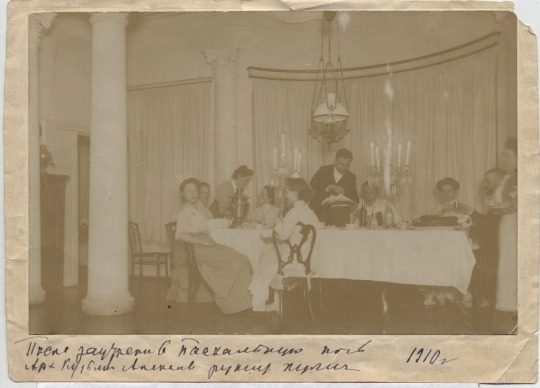
"On the other hand, hearing Aunt Katya speak about God was different. She had explained to me that although God was everywhere, His real home was within us; that He was brighter than sunshine and that each of us should try to rid ourselves of anything tending to obscure His light. “For instance,” she said, “last night when you threw yourself upon the maid Tanya and began to beat her with your fists…” “Yes, but I did it because she was mean: she was beating Mama’s dog, which Mama didn’t like for anyone to touch.” “Yes, but Mama would have liked even less to see you beating one of the maids with your fists,” Aunt Katya said. She spoke in a sweet, penetrating voice, and ended by telling me of how great it is to forgive others their faults, looking instead for one’s own, and what a wonderful opportunity had just opened before me—the chance of my erasing the dark spot which I had planted between God and myself. When the time came for our making our yearly Lenten devotions be- fore Easter, I would have to give a great deal of thought to how to train myself not to attack people like a little wild beast, especially servants, who were in no position to give me a sound thrashing in return. “But if I fight my hot temper, then what?” I asked. “Then the dark spot on your heart will begin to rub off and God’s light will fi- nally burst out from behind it and transform everything—yourself and your life.” This sounded like a wonderful adventurous undertaking, and I began to daydream of how I would begin to fight my vices, perhaps not right away, but some time later, closer to Easter, and of how triumphantly this fight would end by Easter Midnight Mass and the rozgovenniye—the family fast-breaking celebration with koulich and paskha that followed it".
"Visits to the Imperial Court" Olga Ilyin (Boratynsky)
Photo - Boratynsky family celebrating Easter, 1910.
0 notes
Photo
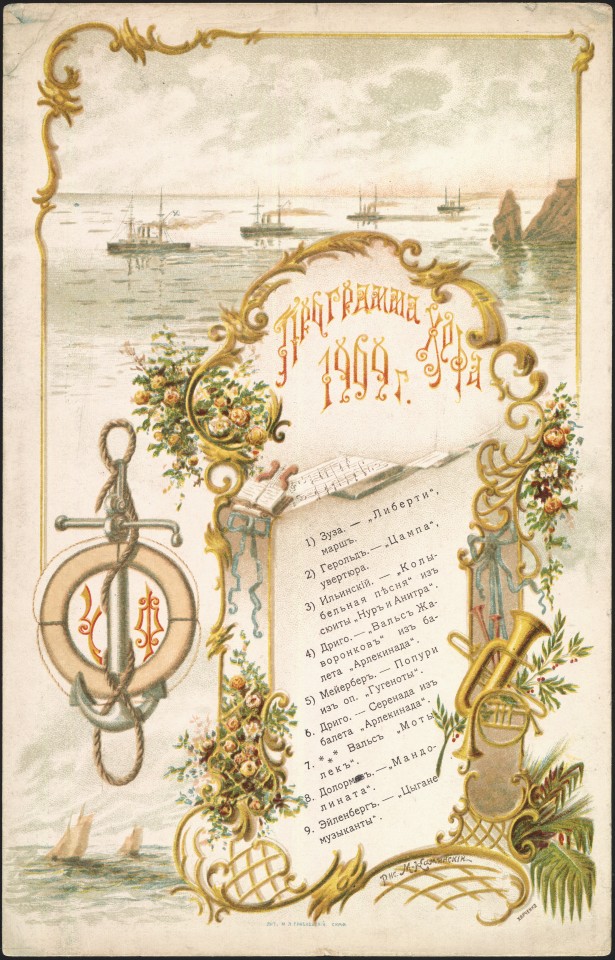
Music of the Romanovs Series
A 1909 program of music performed for the imperial family, probably while aboard the Shtandart. The first 6 are available on YouTube, follow the links below to have a listen:
Sousa’s Liberty March
Herold’s Zampa Overture
Ilyinsky’s Lullaby fr. “Noure & Anitra”
Drigo’s Waltz fr. “Millions d'Arlequin”
Meyerbeer’s medley fr. “Les Huguenots”
Drigo’s Serenade fr. “Millions d’Arlequin”
98 notes
·
View notes
Text
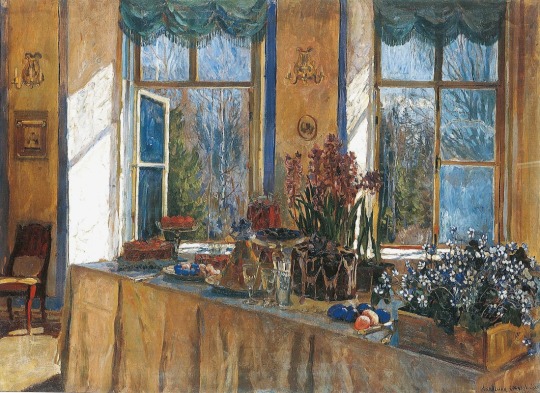
"Easter was late that year, and it was very warm, so it was decided that we would go to Brassowo. We stopped a day in Moscow, and I remember thinking how much Granny had aged since the death of Aunt Vera. The big house at Brassowo was being entirely refurnished and redecorated, so we stayed in what was known as the Guests’ Pavilion, just across the lawn and the front drive. I was delighted to get back there again and find all the familiar landmarks. On Good Friday we painted and dyed the usual eggs, and I heard with delight that I would be allowed to go to the midnight service at the monastery, which was some twelve versts away, That would be nothing in these days, by car, but then had to be done by horse and carriage. The thought of this long drive at night enthralled me and my happiness was complete when I was told that I could stay up for supper after we got home. Then horror of horrors! On Saturday morning I woke up and found that I was completely speechless; my throat was not sore but I could not speak above a whisper. Motia, my maid, I knew would not say anything, and as Miss Rata had by then developed a bulge whose precise significance escaped me and presumably had other things to think about, I spent the day very successfully in avoiding to have to speak to anybody. We had a very early supper, about six, and I was sent to bad until it was time to dress and start for the monastery. I was with Mamma and Uncle Misha in their Victoria, well wrapped up and delighted that nobody had spotted my voice, or rather the lack of it. Then suddenly Mamma asked me a question, and the whole thing came out; she was very angry and said that I would be ill and that it was dangerous to drive about in the cold night air, but we were nearly there by then and there was nothing to be done. I was told that on returning home I would be sent straight to bed, without supper, but Uncle Misha nudged me and I knew it would be all right. The service impressed me tremendously, There was a male choir, with small boys as altos and sopranos; the elder monks had baritones and basses; they all had wonderful voices, and how they sang! I had cold shivers down my back all the time. The Easter midnight service in the Orthodox Church starts on a lugubrious note. The church is hardly illuminated, the singing is sad and subdued, one is still mourning for the death of Christ. Then starts a procession, carrying ikons and banners, most of the congregation following with lighted candles; they walk outside and right round the church, and then one can hear the choir taking on a new note, very gay and lilting, the big candelabras suddenly burst into light and the procession come back by the main door singing: ‘Christ is risen'. The clergy have light vestments on, and the whole atmosphere is one of rejoicing, and you embrace whoever is standing next to you thrice and murmur: ‘Christ is risen’. Then came a short celebration of Mass and we started off for home, Upon arrival there, to my secret relief, nobody mentioned my going to bed, and as soon as the others arrived back in relays from church, supper was started. The whole idea of the supper is the traditional breaking of the fast after the long lenten days. The table was literally groaning with food, hams, chickens, a sucking-pig in jelly with a red egg in his mouth, a turkey stuffed with truffles, bowls of multi-coloured eggs, special Easter cakes known as koulitch and endless variety of hors d'oeuvre, and that delicious concoction of cream cheese, eggs, sugar, and ground almonds, flavoured with vanilla, and compressed into a pyramid shape, which we call paskha. The supper went on for hours, until dawn, but I had been sent to bed long before that".
Nathalie Majolier "Step-Daughter of Imperial Russia"
0 notes
Text
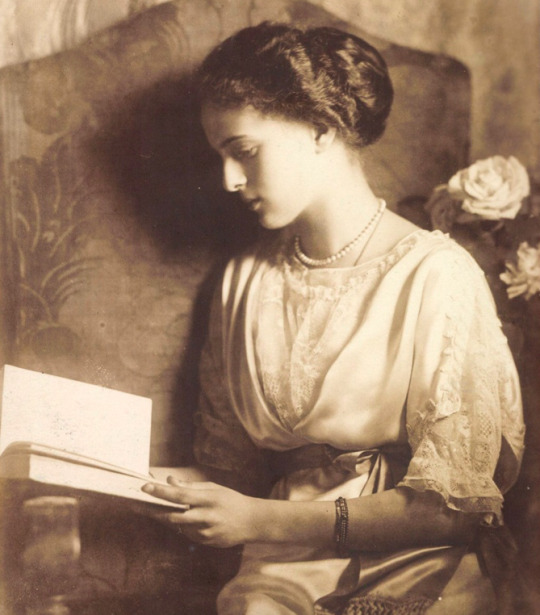
"One day when I was out riding, I met a very beautiful girl accompanied by an elderly lady. Our eyes met and she made such an impression on me that I reined in my horse to gaze at her as she walked on. Every day I went riding on the same road, at the same hour, hoping to meet the lovely stranger again. I waited in vain and then wended my sad way home. But one afternoon the Grand Duke and the Grand Duchess Alexander called on us accompanied by their daughter, the Princess Irina. To my surprise and delight I recognized the girl I had met on my ride. This time I had plenty of time to admire the wondrous beauty of the girl who was eventually to become my wife and lifelong companion. She had beautiful features, clear-cut as a cameo, and looked very like her father".
Prince Felix Yusupov "Lost Splendor"
0 notes
Text

"My mother disliked violence for whatever cause, and spoke of ‘the terrorists’ with horror and of the Imperial family with compassion. I remember her saying that governing Russia was ‘a cross’ which the Tsar and his family had to bear. It was a duty imposed on them by their birth, and they had no choice but to accept it. The Empress Alexandra was ‘a tragic figure’; after having waited for years for a son, she at last gave birth to one but he was a haemophilic whose life was threatened by the slightest cut or scratch, which could cause him to bleed to death. The Tsar was ‘a kindly man of simple tastes, devoted to his wife and children’. He would ‘willingly give up his throne if his sense of duty were less strong’. His reign had been ‘bedevilled by the double disaster of the war with Japan and the revolution of 1905’. He and his wife were ‘not to blame’ for these misfortunes: they should be ‘pitied and prayed for’"
Elisaveta Fen "A girl grew up in Russia"
0 notes
Text
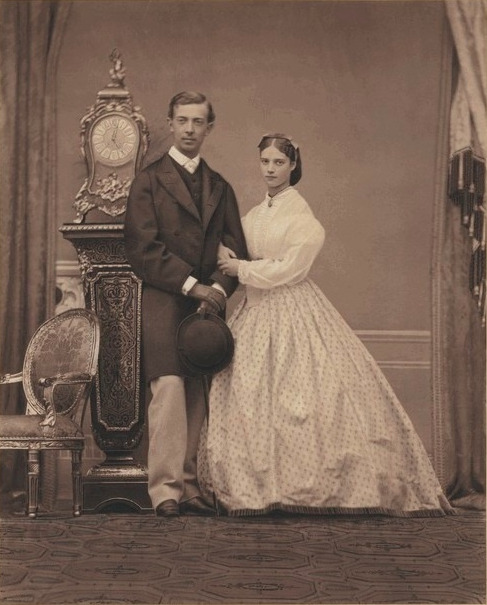
"Your sympathy gave great pleasure to me and to my child, so severely tried so early in life ... She tells me that she would not for the world have missed the past, short but happy as it was, and his look, as the Tsar led her by the hand up to his bed, I shall never forget! It was of the purest happiness, and he recognised er the whole day when he was dying! He said goodbye to her, kissed her and held her hand firmly in his until he died! We had travelled for four days and four nights and she never left his bedside, kneeling by him day and night until 1 o’clock when she kissed him and he breathed away his young life! For me it was terrible, for I loved him very much, and saw all the happiness of the poor young bride-to-be ebbing away ... Minny is at Darmstadt for a day, to see the parents again. The whole dear family is so kind and loving to her that the parting is doubly painful for her."
Queen Louise in a letter to Queen Victoria
9 notes
·
View notes
Text
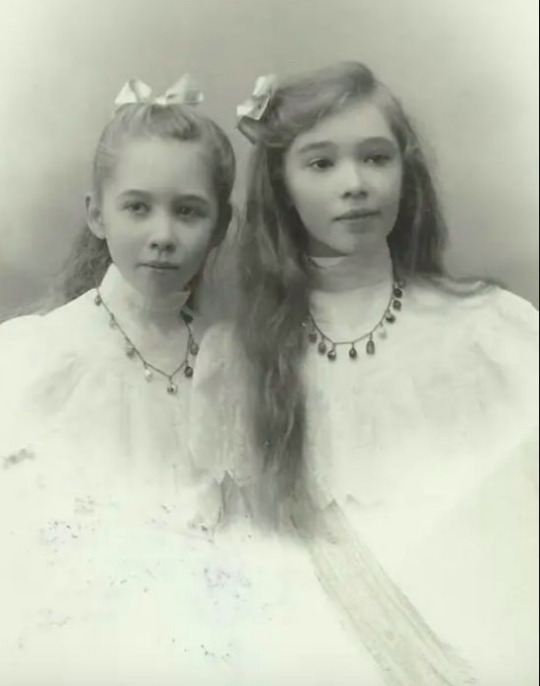
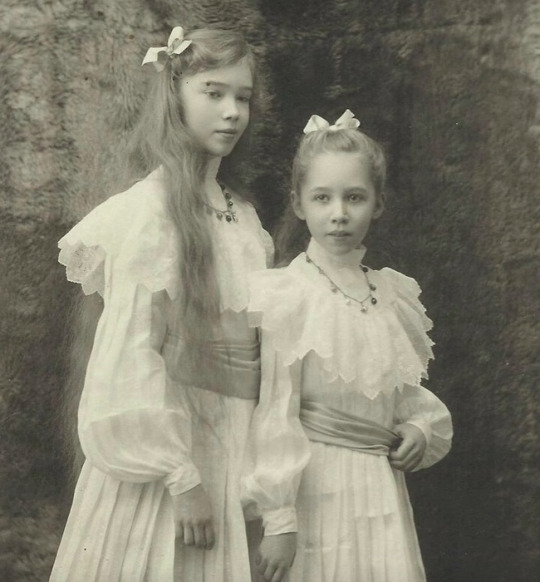
Sisters Alexandra and Anastasia Botkin in their easter necklaces.
0 notes
Text
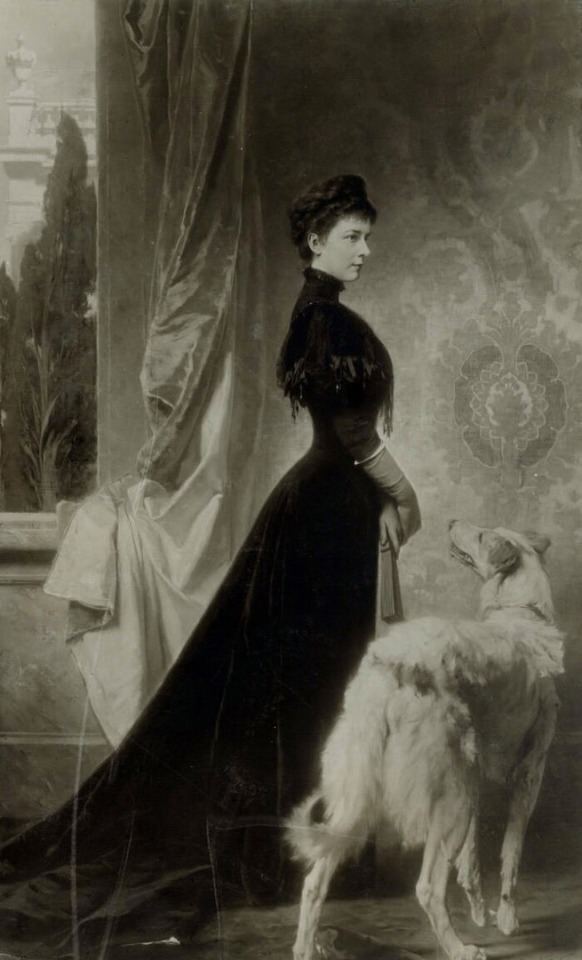
"We often went to the Hofburg, where I once had a glimpse of the Empress Elizabeth as she glided through a corridor, looking like some beautiful ghost. She always attracted me strangely, and it may have been that some kind of subtle sympathy between her past troubles and my future ones drew us together.
The Empress was really a lovely woman, and her hair was exquisite. When it was unbound it simply enveloped her, and one maid was specially selected to dress it. The coiffure was carried out in rather a strange way. The carpet in the dressing-room was covered with white
linen sheeting, and the Empress sat on a low chair in the middle of the room. The maid was dressed in white, and a most curious proceeding took place when the process was over of brushing and combing the luxuriant tresses and braiding them into the elaborate plaits affected by the Empress. The maid collected and counted every hair that remained in the brush and comb, and active search was also made on her dress and on the carpet for any other hairs which had fallen out. The number was then told the Empress, who was exceedingly displeased if she thought too many hairs had come out during the "dressing," and the maid had a mauvais quart d/heure in consequence.
The Empress had many eccentricities, mostly well known to the public, but I remember hearing that, on one occasion, when she was stopping at Lainz, she indulged in a very fatiguing escapade. She was in the habit of taking her "Greek Reader" with her on her walks in the lovely woods and park which surround the castle, and she rarely went beyond them. One evening she ventured outside, but as she had a silent fit on, the Reader had perforce to be silent also, and for eight hours of the night the Empress walked round Vienna, wrapped In her own sad and gloomy thoughts, and was only recalled to herself and her surroundings
when day broke and she found that she was outside her own domain with a very patient and footsore Reader in attendance.
I saw the Empress Elizabeth in May 1889, after the tragedy of Meyerhng, when I went to receive from her the Stern Kreuz Order. This Order is always given to Austrian Archduchesses when they attain their majority, and marks their formal presentation at the Court of Vienna. I went to the H of burg with my mother, and the Empress received us in special audience. She was dressed in the deepest black. Her face, which looked out like some pale snow-flower from the folds of her heavy crepe veil, showed traces of incessant weeping, and she had a nervous habit of constantly wiping the corners of her mouth with her handkerchief.
She was very kind to me when I thanked her for presenting me with the Order, and I felt the sharp contrast between myself in all my youth and this sad mother who seemed to have completely finished with the splendour and gaiety of the life to which my Stern Kreuz Order was the passport.
I never again saw her alive. When I stood by her coffin in the Imperial vault of the Capucins, I felt that she was happy at last, and I like to imagine her spirit roaming untrammelled in the Elysian fields, exchanging thoughts with Heine, and reunited to her much-loved Rudolph.
Few people really understood the Empress, and her excessive shyness was often attributed to pride or artificiality. Many troubles had chilled her emotions, and she became a prey to the spirit of unrest ; but as a beautiful woman and a devoted mother Elizabeth of Austria has had few equals".
Luise von Toscana "My own story"
0 notes
Text
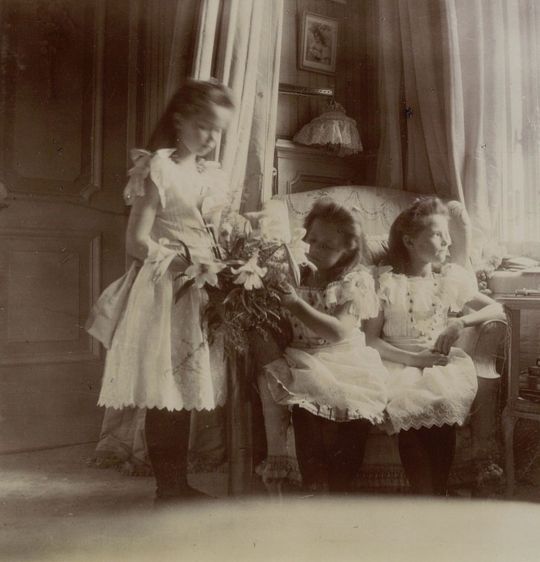
"In Peterhoff during the hot June weather the little Grand Duchess Marie was born. She was born good, | often think, with the very smallest trace of original sin possible. The Grand Duke Vladimir called her “The Amiable Baby” for she was always so good and smiling and gay. She is a very fine and pretty child, with great, dark-blue eyes and the fine level dark brows of the Romanoff family. Lately speaking of the child, a gentleman said that she had the face of one of Botticelli’s angels. But good and sweet-tempered as she is, she is also very human, as the following stories will show. When she was a very little child, she was one day with her sister in the Empress’s boudoir, where the Emperor and Empress were at tea. The Empress had tiny vanilla-flavoured wafers called biblichen, of which the children were particularly fond, but they were not allowed to ask for anything from the tea table. The Empress sent for me, and when | went down little Marie was standing in the middle of the room, her eyes drowned in tears and something was swallowed hastily. “There! I’ve eaten it all up,” said she, “you can’t get it now.” | was properly shocked, and suggested bed at once as a suitable punishment. The Empress said, “Very well, take her,” but the Emperor intervened, and begged that she might be allowed to remain, saying, | was always afraid of the wings growing, and I am glad to see she is only a human child.” She was constantly held up as an example to her elder sisters. They declared she was a step-sister. Vainly I pointed out that in all fairy tales it was the elder sisters who were step-sisters and the third was the real sister. They would not listen, and shut her out from all their plays. I told them that they could not expect her to stand that kind of treatment, and that someday they would be punished. One day they made a house with chairs at one end of the nursery and shut out poor Marie, telling her she might be the footman, but that she should stay outside. | made another house at the other end for baby, then a few months old, and her, but her eyes always kept travelling to the other end of the room and the attractive play going on there. She suddenly dashed across the room, rushed into the house, dealt each sister a slap in the face, and ran into the next room, coming back dressed in a doll’s cloak and hat, and with her hands full of small toys. “I won’t be a footman, I’ll be the kind, good aunt, who brings presents,” she said. She then distributed her gifts, kissed her “nieces,” and sat down. The other children looked shamefacedly from one to the other, and then Tatiana said, “We were too cruel to poor little Marie, and she really couldn’t help beating us.” They had learned their lesson-from that hour they respected her rights in the family".
Margaret Eager "Six years at the Russian court"
#otma#grand duchess olga nikolaevna#grand duchess tatiana#romanovs#grand duchess maria nikolaevna#memories
39 notes
·
View notes
Text
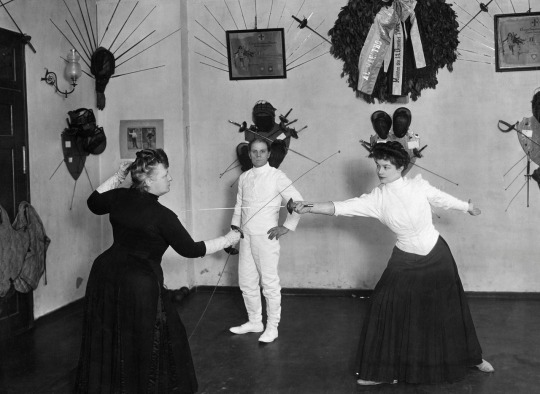
Princess Elizabeth Oettingen-Spielberg. Fencing lesson.
1 note
·
View note
Text
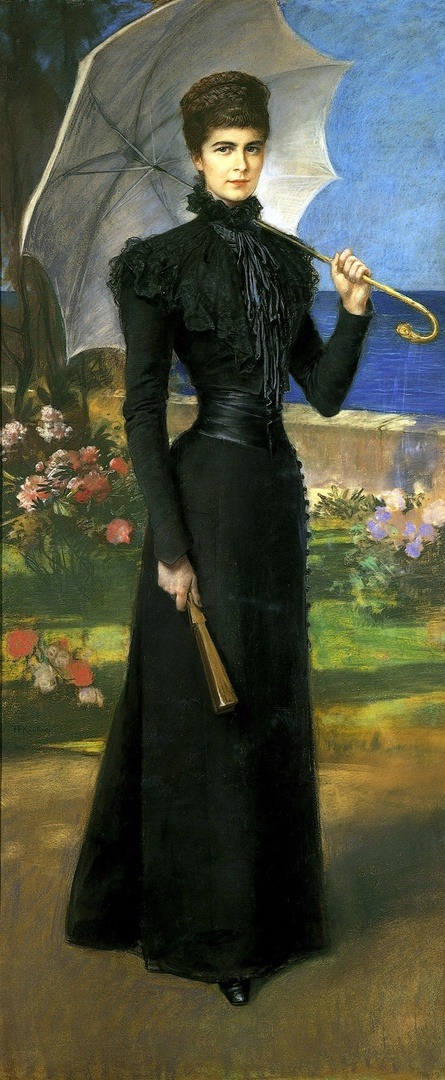
"About 11 kilometers from Mon Repos, the Empress Elizabeth of Austria had bought herself an estate on a high hill overlookong the sea. There she built a huge house surrounded be terraces. Unfortunately, it looked more like a resort hotel than a villa. She named it Achilleion, after a very big and beautiful marble statue of dying Achilles, which she placed on the principal terrace. The inside of the house was in Pompeian styleand rather painful to behold. In the entrance hall there was a flat square marble slab, with the head of a drowned woman in relief. On this object the Empress invariably threw a small bouquet of violets when she left Corfu.
Empress Elizabeth always had a Greek gentleman attached to her, who gave her lessons in modern Greek; and she came to speak the language perfectly. Her one passion in those days (after she had given up riding) was walking; and walk she did for hours at a time, exhausting all those who were obliged to accompany her. She often walked all the way from the town of Corfu up to Achilleion, a distance of 19 kilometers. She carried an enormous black fan - one of the hugest I have ever seen - and when people bowed to her, she instantlyflopped it open to hide herself. During these walks the Empress would frequently feel overheated, what with the exercise and the warm climate of Corfu. When this happened, she would remove a petticoat or two behind a tree and give them to her gentleman to carry''.
A Romanov Diary the Autobiography of the Grand Duchess Marie Georgievna of Russia
0 notes
Text
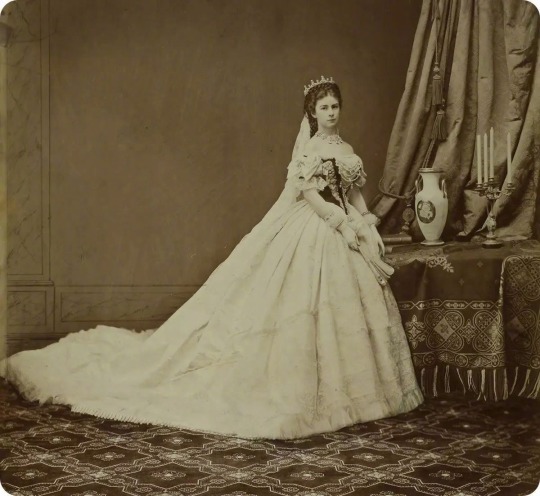
"We all felt a deep veneration for Queen Elizabeth, the Empress of Austria. She was remembered as a remarkably intelligent woman, the guardian angel of the Hungarians, a paragon of virtue. Not so the Emperor. He was considered a wicked old fool, heartless, cruel and selfish, who made his wife’s existence miserable...
...Not until much later, when I was grown-up, did I hear — from outsiders — the gossip about grandfather and the Empress. How far it was true I do not know, for it was bitterly and emphatically denied by my parents, the slightest allusion to it being tres mal vue....
When my grandfather was on his deathbed in a little fishing village on the Istrian coast, the Empress Elizabeth sent him a gold watch. It was not a very tactful present for a dying man, I thought. He seldom spoke of her, but adoration and idealization of the Empress became a tradition in our family, and our contempt for the Emperor had its origin in grandfather’s feelings".
Countess Catherine Károlyi (Andrássy) "A life together : the memoirs of Catherine Károlyi"
5 notes
·
View notes
Text
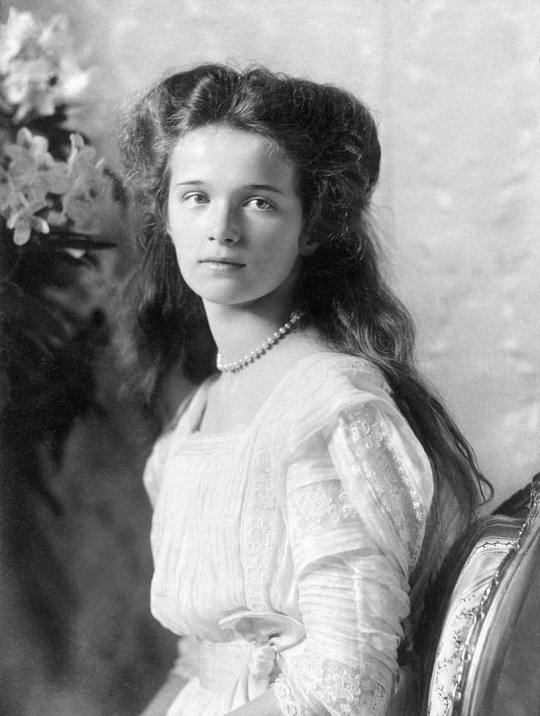
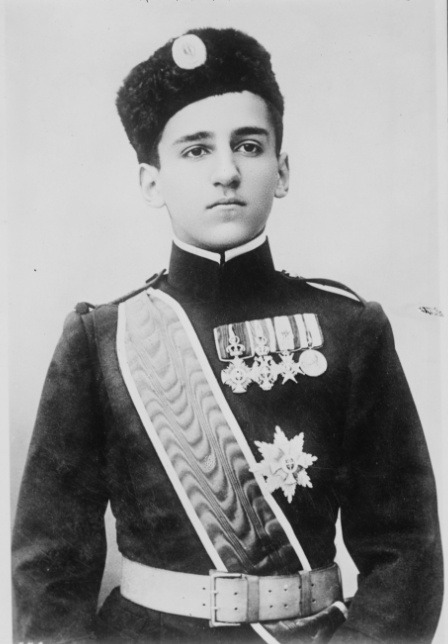
Из дневника Великой княжны Ольги Николаевны:
12 января 1914: "Александр Сербский приехал в [нрзб] русской форме. Ух какие глаза".
15 января 1914: "Около Александра Сербского стояла, он немножко дальше. Ух, ух какой".
17 января 1914: "Завтракали с Папа, Тетей, Костей и Александром С[ербским]. С ним сидела. Милый, конфузливый и красивый ужас".
19 января 1914: "Мама не знаю как. Заснула после 3 ч. Спаси ее и всех Господи и Александра С[ербского]".
25 февраля 1914: "Месяц не видела Александра С[ербского]".
21 марта 1914: "Хорошо было и видеть сестру А[лександра]".
25 марта 1914: "2 месяца не видела Александра".
4 сентября 1914: "Папа дал Александру Сербскому Георгиевский крест 4[й] ст[епени]. Очень радуюсь. Помоги Боже".
31 декабря 1914 " Папа послал Александру Георгиевский крест 3-й степени. Очень рада".
1 note
·
View note
Text

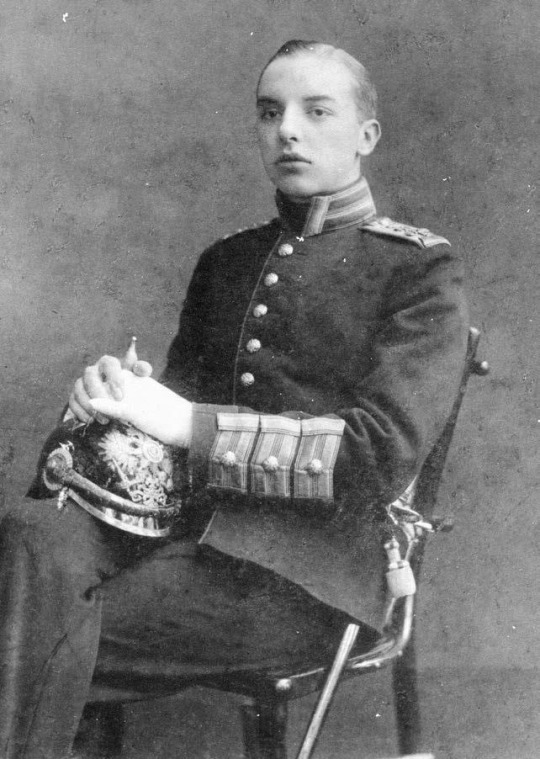
"During the Romanov tercentenary celebrations in 1913, Vladimir was one of the equerries to the Grand Duchess Tatyana. That same year, the House of Romanov celebrated its tercentenary. Vladimir had the honour of being one of the equerries to her Royal Highness, the Grand Duchess Tatyana Nikolayevna, Tsar Nicholas II’s second-oldest daughter. He es- corted her to a number of the lavish state functions and balls. The graceful young duchess enchanted him, particularly when they danced the Polonaise together. Chuckling, Vladimir recalled how his disliked childhood dancing lessons proved invaluable. The young Grand Duchess Tatyana would later be murdered with the rest of the imperial family in Yekaterinburg".
Olga Hawkes "Russian at Heart: Sonechka's Story"
21 notes
·
View notes
Text
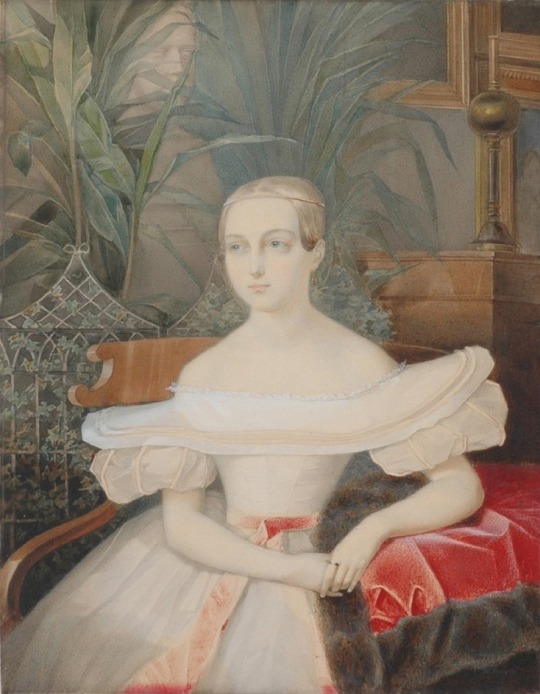
Великая княжна Ольга Николаевна в дневнике Жозефа Виельгорского. 1838 год.
9 февраля (28 января) "Вечером в Эрмитаже. Прелестные великие княжны. Был счастлив видеть, что они стесняются. Ольга была изумительна".
11 февраля (30 января) "Чудесная Ольга дружески поздоровалась со мною, подозвала меня и расспрашивала обо всем семействе с очаровательной добротой и непринужденностью. Какое восхитительное создание. Ее красота столь же незаурядна, сколь мастерство Тальони".
7 марта (23 февраля)"Ольга Никол<аевна> спросила меня, веду ли я дневник, как Адлерберг; она одна проявляет ко мне какой-то интерес".
6 апреля (25 марта) "Любовался Ольгою Николаевною".
11 апреля (30 марта) "Из дам меня интересуют только Императрица и Великие Княжны, но более воспоминанием, нежели настоящею любовью. Любовь к Ольге Николаевне прошла; ее холодность, появление Taglioni были причиною сего изменени��".
18 (6) апреля "Однако м��е внимание было поглощено Ольгой Н<иколаевной>; это невероятная, неслыханная, неземная красота".
22 (10) апреля "Был у обедни; мне кажется, что Ольга Ник<олаевна> в некотором пренебрежении; я очень рад этому. ︎Дай ей Бог сохранить чистоту".
1 note
·
View note
Text

"I might here mention certain fixed rules for our life, which my mother had adopted from those used in her youth. We rose early. When I was about 13, I remember my sister Ella and I getting up in winter by candlelight and starting lessons at 7 We breakfasted with our parents at 9 o'clock, and had an hour's exercise out of doors, after which we had what we called "little lunch" consisting of milk, fruit and biscuits at 11, and at 2 o'clock we lunched with our parents. I would mention here that my mother adhered to the diet Queen Victoria and the Prince Consort had instituted for their children. We were never given spiced or rich food, simple dishes being served up for us. We never objected to anything given us at home, but the awful bread and butter puddings without a raisin in them or the stodgy tapioca pudding full of lumps we got in Queen Victoria's houses I still remember with a shudder of disgust. On the rarest of occasions were we given a sweet or a bonbon, but we were always allowed a lump of sugar if we wanted something sweet, and so to this simple fare I attribute my excellent digestion in after life. After lunch we again went out for 1½ hours in all weathers and had schoolroom tea at 5 This over, we went down to my mother's room where we played about with the younger children. We went to bed at 6.30, later on at 7 when preparations took more time".
Recollections of Victoria Mountbatten, Marchioness of Milford Haven
2 notes
·
View notes
Text
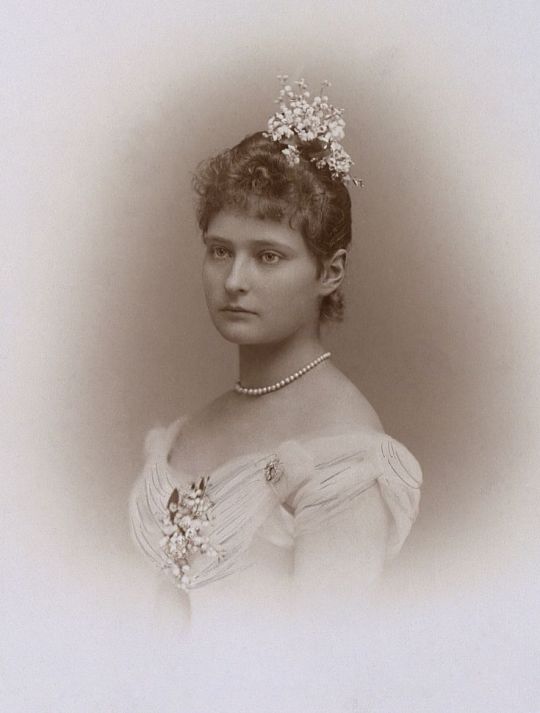
"Alix was a very wonderful person; not, perhaps, as beautiful as her beloved sister, the Grand Duchess Elizabeth, but very striking. There was a curious atmosphere of fatality about her. I once said — in the way that cousins can be very rude and outspoken to each other — “Alix, you always play at being sorrowful : one day the Almighty will send you some real crushing sorrows and then what are you going to do?” Well, I think history has proved how right I was.
Princess Marie Louise of Schleswig-Holstein "My memoires of six reigns".
36 notes
·
View notes